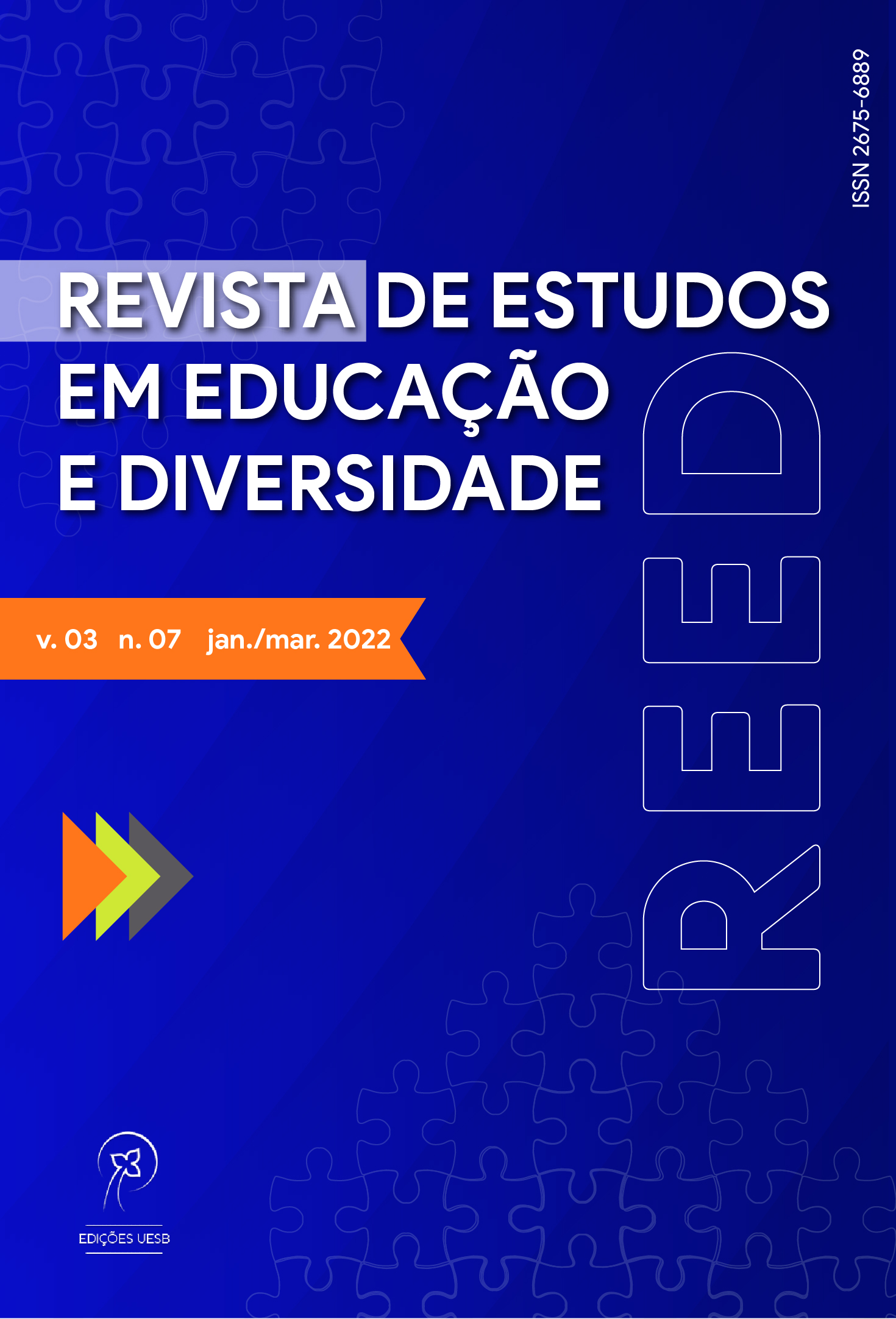TEACHING MATHEMATICS: A CASE STUDY IN A MEXICAN URBAN ELEMENTARY SCHOOL
DOI:
https://doi.org/10.22481/reed.v3i7.10432Keywords:
Teaching, Learning, Mathematics, Professional competence, TextbookAbstract
The objective of this research is to understand the mathematics teaching processes carried out by a third grade primary school teacher in a Mexican urban school and its impact on student learning. The approach used was qualitative and the instrumental case study as a strategy. The techniques were non-participant observation and ethnographic interview. As a result, little supervision and feedback on the performance of the students was identified by the teacher in each didactic sequence, the formative evaluation was absent. Students show difficulties in performing subtractions and multiplications through mental math. It isconcluded that teaching is based on a routine logic predetermined by the textbook; progress is made rapidly in the program, but learning is not consolidated.
Downloads
References
ABDALLA, María de Fátima Barbosa. En las redes de la profesión. Resignificando el trabajo docente. Revista Mexicana de Investigación Educativa, vol. IX, núm. 20, p. 159-181, 2004. Disponível em: https://www.comie.org.mx/revista/v2018/rmie/index.php/nrmie/article/view/839/839. Acesso em: 20 ago. 2019.
CARR, David. El sentido de la educación: una introducción a la filosofía y teoría de la educación y de la enseñanza, España, Grao. 2005.
DÍAZ-BARRIGA, Frida; HERNÁNDEZ, Gerardo. Estrategias docentes para un aprendizaje significativo: una interpretación constructivista. México: Mc Graw-Hill. 2005.
FRADE, Laura. Taller nacional: planeación por competencias para el fortalecimiento del grupo académico nacional en el marco de la reforma integral de educación básica. México: SEP. 2010.
FERREIRO, Ramón. Una exigencia clave de la escuela del siglo XXI: la medición pedagógica. Disponível em: https://issuu.com/formandolideresciudadanos/docs/una_exigencia_clave_de_la_escuela_del_sxxi_la_medi. Acesso em: 06 ago. 2019.
GÁLVEZ, Grecia. La didáctica de las matemáticas. In: PARRA, Cecilia. SAIZ, Irma. Didáctica de matemáticas: aportes y reflexiones. Argentina: Paidós, p. 39-50. 1994. Disponível em: https://www.academia.edu/41299841/Did%C3%A1ctica_de_matem%C3%A1ticas_Aportes_y_reflexiones_Cecilia_Parra_e_Irma_Saiz_comps. Acesso em: 29 jun. 2019.
GARCÍA GARCÍA, Emilio. Competencias éticas del profesor y calidad de la educación. Revista electrónica interuniversitaria de formación del professorado. vol. XIII, núm.4, p. 1-379, 2010. Disponível em: https://www.redalyc.org/articulo.oa?id=217015570003. Acesso em: 19 ago. 2019.
RETANA, José Ángel García. Modelo educativo basado en competencias: importancia y necesidad. Revista Electrónica Actualidades Investigativas en Educación, vol. XI, núm. 3, p. 1-24 set/dez. 2011. Disponível em: https://www.redalyc.org/articulo.oa?id=447/44722178014. Acesso em: 15 jun. 2019.
MÉXICO. Instituto Nacional de Evaluación Educativa (INEE). Resultados de 6° de primaria: lenguaje y comunicación matemáticas. Planea. México. [2018]. Disponível em: https://www.inee.edu.mx/wp-content/uploads/2019/01/PLANEA06_Resultados_Veracruz_20181130.pdf. Acesso em: 31 jun. 2019.
MÉXICO. Secretaría de Educación Pública (SEP). Guía para el maestro: educación básica. Primaria. Tercer grado, México, SEP. Disponível em: https://colegiojosefadesalamanca.edu.mx/Prog3Primaria.pdf. Acesso em: 06 jul. 2019.
MÉXICO. Secretaría de Educación Pública (SEP). Plan de estudios 2011, México, SEP. [2014]. Disponível em: https://www.gob.mx/cms/uploads/attachment/file/20177/Plan_de_Estudios_2011_f.pdf. Acesso em: 01 jun. 2019.
MÉXICO. Secretaría de Educación Pública (SEP). Aprendizajes clave para la educación integral: plan y programas de estudio para la educación básica. México, SEP, [2017]. Disponível em: https://www.planyprogramasdestudio.sep.gob.mx/descargables/APRENDIZAJES_CLAVE_PARA_LA_EDUCACION_INTEGRAL.pdf. Acesso em: 30 mayo 2019.
MÉXICO. Secretaría de Educación Pública (SEP). Modelo educativo para la educación obligatoria. Educar para la libertad y la creatividad, México, SEP. [2017]. Disponível em: https://www.gob.mx/cms/uploads/attachment/file/207252/Modelo_Educativo_OK.pdf. Acesso em: 18 mayo 2019.
LEÓN-LEÓN, Giselle. Aproximaciones a la mediación pedagógica. Revista Calidad en la Educación Superior, vol. V, núm. 1, p. 136-155. Mayo. 2014. Disponível em: https://revistas.uned.ac.cr/index.php/revistacalidad/article/view/348. Acesso em: 05 ago. 2019.
MORAL, Cristina.; PÉREZ, María. El profesorado ante la enseñanza. In: MORAL, Cristina (Coord). Didáctica teoría y práctica de la enseñanza. España: Pirámide, 2009.
PERRENOUD, Philippe. Diez nuevas competencias para enseñar. Invitación al viaje, Paris, Graõ. 2017.
PINEDA, Ignacio Pineda. Competencias para el desarrollo del trabajo docente en la escuela primaria. In: X Congreso Nacional de Investigación Educativa-COMIE. Veracruz, México, septiembre 2009. Disponível em: http://www.comie.org.mx/congreso/memoriaelectronica/v10/pdf/area_tematica_15/ponencias/0879-F.pdf. Acesso em: 04 de jun. 2019.
RODRÍGUEZ, Gregorio; GIL, Javier. GARCÍA, Eduardo. Metodología de la investigación cualitativa. Archidona, Aljibe. 1996.
STAKE, Robert. Investigación con estudio de casos. Madrid, Morata. 1998. Disponível em: https://www.uv.mx/rmipe/files/2017/02/Investigacion-con-estudios-de-caso.pdf. Acesso em: 15 abr. 2019.
Downloads
Published
Issue
Section
License
Copyright (c) 2022 Revista de Estudos em Educação e Diversidade - REED

This work is licensed under a Creative Commons Attribution 4.0 International License.
You are free to:
Share - copy and redistribute the material in any medium or format; Adapt - remix, transform, and build from the material for any purpose, even commercially. This license is acceptable for Free Cultural Works. The licensor cannot revoke these freedoms as long as you follow the terms of the license.
Under the following terms:
Attribution - You must appropriately give credit, provide a link to the license, and indicate if any changes have been made. You may do so in any reasonable way, but not in a way that suggests that you or your use is endorsed by the licensor.
There are no additional restrictions - You cannot apply legal terms or technological measures that legally restrict others to make any use permitted by the license.












